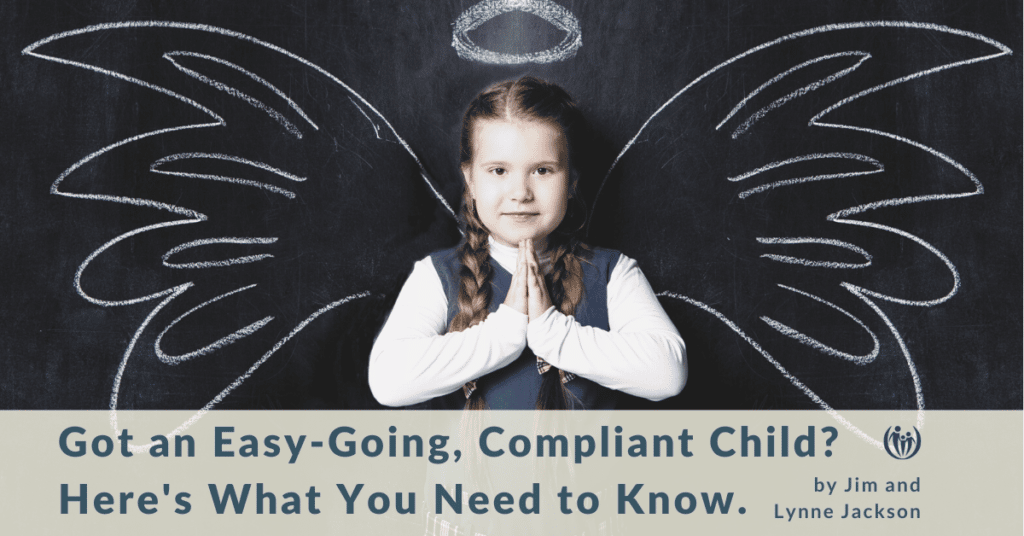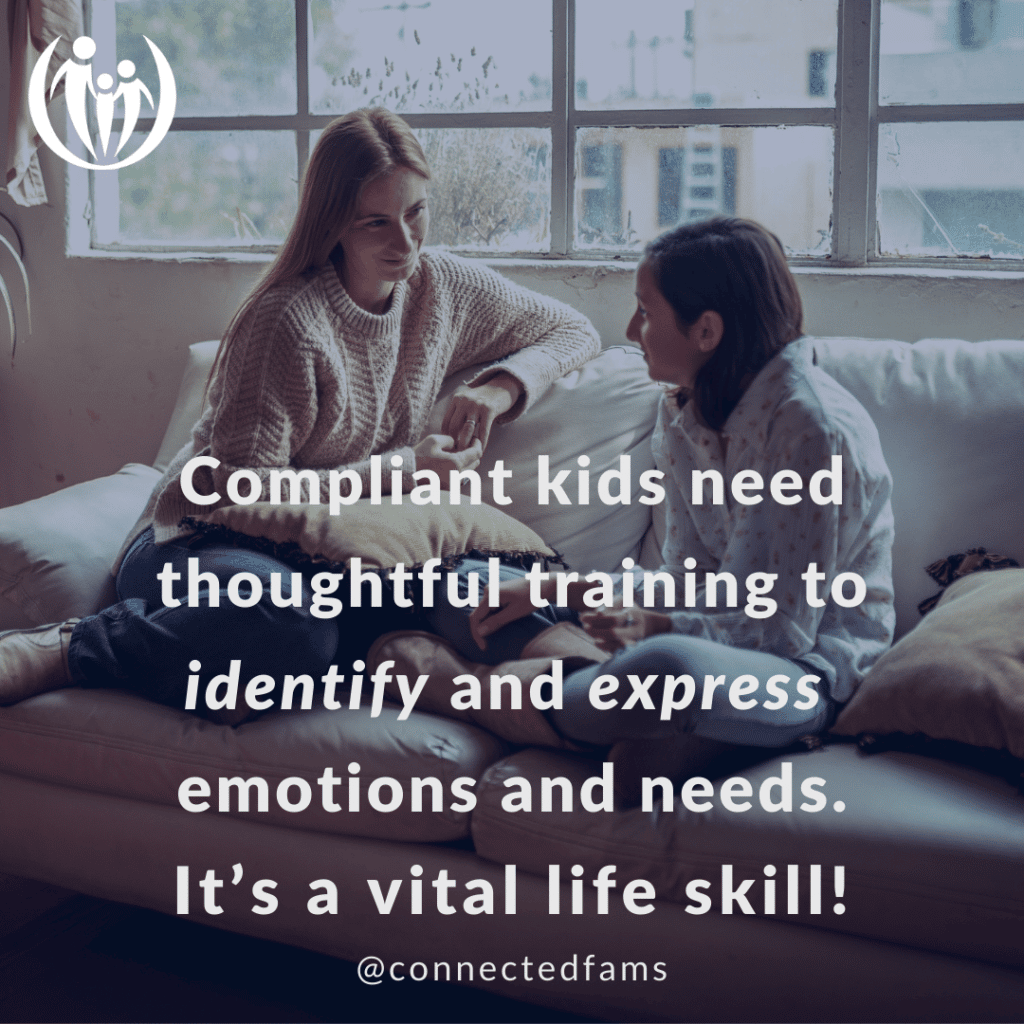
Got an Easy-Going, Compliant Child? Here’s What You Need to Know.

“He’s such an easy-going child!” “She’s always Mama’s little helper.” “He just goes with the flow!” “She is the definition of a good kid.” These are probably compliments you’d be thrilled to hear about any child. The thing is these wonderful traits can also be the warning signs of an overly compliant child.
You see, compliant children have a unique set of struggles. It’s easy to put all of your attention on trying to “fix” the behavior of your more intense kiddos. Aside from the fact that fixing anybody’s behavior is a futile goal, your compliant child deeply needs attention and thoughtful guidance too. Not all compliance is healthy.
Most families have a child who is naturally more intense and challenging, and another who is naturally more compliant. Over time those characteristics can become exaggerated as kids’ identities form around the roles and patterns of their family. Parents often ask us about those “squeaky wheel” (defiant, tantrum-throwing, strong-willed) kids. Rarely (if ever) do they ask about those kids’ easy-to-raise siblings.
It’s time to give children who fly under the radar some much-needed attention.
Table of Contents
The compliant child who wants to hold the family together
Eleven-year-old Cate was sweet and compliant. She was a hard worker and did well in school. She was the kind of kid who makes life easy for her parents but can go unseen with her struggles. She was also a regular observer of her sister Ashley’s frequent, dramatic screaming outbursts aimed at Leah and Kevin, the girls’ parents. Everyone knew what was on Ashley’s mind, because it came flying out as an unfiltered verbal barrage, bouncing from gregarious to hilarious to furious!
During a parent coaching session, Leah realized the possible impact on Cate who was often still in the room after her sister would storm off. “Oh, I can imagine what she feels when she watches us roll our eyes, sigh, and talk about how frustrating Ashley is. Cate must be terrified to have us talk about her like that when she’s gone.”
Leah and Kevin were concerned that there was a lot going on under the surface with Cate, so Leah set aside some special time away to connect with her. Over dinner after plenty of safe small talk, Leah gently asked, ”Cate, do you ever feel like you have to hold the family together?” Although Cate couldn’t articulate her emotions, a couple of tears ran down her cheeks, each an overflow of the stress and anxiety she was feeling.
Compliant kids can easily feel like they are overlooked when it comes to support and concern from their parents, especially if there is an intense child in the family or significant marital conflict.
Note: This doesn’t mean all compliant kids are unhappy. Your easy-going child might just be enjoying childhood right now (lucky you!). But compliant children are more capable of masking difficult emotions. That means you could have a child who is unable to express significant internal struggles and really needs your guidance. How can you tell if your compliant child is really struggling?

When compliance isn’t healthy: 7 indicators
Do any of these descriptions fit your child? Your compliant child might mix a few of these types and certainly, no child fits into any exact category. However, if you see these types of behaviors in your child, it may be time to dig deeper.
1. People pleasing
“I’ll be who people want me to be.” Our son Noah struggled with this because he watched the power struggles we would get into with his older brother and thought, “That’s so stupid! Why does he do that?” Noah was eager to avoid conflict and earn our approval. (Whew, finally… an easy kid!)
Unfortunately, we built an identity around this as we nicknamed him, “JoyBoy” and “Sunshine in Skin,” and described him as “the grease in our Jackson cogs.” Over time we realized this affirmation had a downside of burdensome expectations. When making these types of statements, parents may inadvertently communicate, “You belong and have a place in this family when you make my life easier.”
2. Perfectionism
A people-pleaser personality may escalate into a struggle with perfectionism. This child might be saying, “The best way to make sure people never feel aggravated by me is to work hard and perfectly meet their expectations!” Perfectionism feeds on the drive to avoid negative evaluation or feedback. This may cause kids to be fragile and afraid to fail or take risks. Perfectionistic kids may also often have a difficult time accepting compliments because they lack confidence and feel they really don’t deserve the affirmation.
3. Excessive “peacemaking”
The excessive “peacemaker” is not really working toward true peace and reconciliation. They just want the conflict to stop. They’re fearful of conflict and will not always stand up for things that they should. These compliant children believe that conflict is bad. They may even believe the lie that conflict reflects their own value. In other words, getting into conflict means, “I’m bad.” If that’s their belief, they will naturally want to do whatever they can to subdue conflict.
One mom wrote, “Our daughter struggles with her self-identity and often gives in and apologizes even when something isn’t her fault.” Kids may also avoid conflict by withdrawing to their toys, art, music, screens, books, pets, etc., especially when tensions rise.
4. Suppressed feelings
For many compliant kids expressing feelings and needs is hard. This can be caused by lots of factors. Kids may not express what they want and how they feel because they are afraid of the rejection that could come with sharing difficult feelings. In highly stressed families, they may not feel emotionally safe to share. Or they haven’t been taught how to share their feelings. These kids may want to avoid stressing their already stressed parents.
When things cool down a child may feel more comfortable sharing (if they’ve been given the tools to do so). In one family, when a very challenging child began to do better, her “easy-going” brother shared that he was experiencing serious depression. Thankfully he was able to express his deep feelings and receive help while he was still in high school and living at home.
5. Silent resentment
A compliant child might go through all the motions of obedience and respect while harboring deep resentment. For example, compliant kids may be resentful that they work so hard to be good, but their sibling steals their parents’ attention and always seems to get away with more. This can lead to a preoccupation with fairness and getting what they think they deserve.
6. Love deficits
The compliant child doesn’t often put their needs on full display for their parents. As a consequence, their more intense siblings are more likely to get their needs met. Over time, if a compliant child misses getting attention and consideration for their needs, they may feel less loved. In late grade school, Noah expressed that he didn’t feel as loved as Daniel and Bethany, who more overtly sought our attention. We hadn’t communicated love in a way that fully met his needs.
7. Judgments and competition
A compliant child may think in concrete, all-or-nothing terms (good kid/bad kid thinking). They may make judgmental comments about others and may not even see themselves as needing God’s forgiveness and grace. “I’m the good kid around here, and that makes me special.” They might be happy when the “bad kid” gets in trouble, or even set them up for that.
But if their sibling’s difficult behavior improves the compliant child becomes less “shiny” by comparison and that can be unsettling. They may try to sabotage their sibling’s positive progress, or they may even trade places in the family dynamics and start to act out. “He’s getting the ‘good kid’ attention now, so what’s left for me?”
In coaching families, I’ve seen this changing roles phenomena occur numerous times. In one really obvious example, a previously compliant, easy-going older sister began to regularly be upset and emotional at bedtime after her difficult brother started to pop into bed cheerfully. “I’m starting to act like Josh used to!” she cried one evening.
Is your child overly compliant?
If your child doesn’t fit the above categories at all, you probably have a genuinely good-natured, easy-going child. But if you do see a number of these characteristics, or one or two to an extreme, it deserves a deeper look. While we can’t point to research, our years of experience suggest that the greater the stress in the home or the internal anxiety of the child, the greater the likelihood of unhealthy compliance.
Why is overly compliant behavior a problem?
You might want to say, “Seriously, I just need a break! What could possibly be the downside of having an easy child?” Here are a few ideas to get you thinking.
- Resentful, compliant kids don’t necessarily stay compliant. They may decide at some point that they’ve had enough of the hard work and low payoff of being easy, and choose instead to openly rebel. For example: The older, previously-compliant sister of an anxious, wildly tantruming preschooler rebelled so strongly during middle school that her mom said, “I wasn’t sure our family would survive that challenge.”
- When compliant kids finally leave home, they may transfer their compliance to somebody else. They are more likely to pair up with controlling friends and partners, who will take advantage of their overly compliant tendencies.
- We’ve also heard from people who had been compliant until they left home, only to slip into extremely risky behavior, such as substance abuse. Years of suppressed hurt and resentment, combined with a lack of solid identity and an unwise peer group, is a dangerous combination.
- Compliant kids may be more likely to be bullied by their peers.
These are not a forecast of doom, but simply good reasons to learn to instill healthier identity messages in your compliant child and grow their skills to self-advocate. And we can help!
We approach parenting challenges through the lens of the Connected Families Framework. We help parents learn to communicate four key messages that children thrive on, both during everyday life and at key discipline moments as well:
- You are SAFE with me.
- You are LOVED no matter what.
- You are CALLED and CAPABLE.
- You are RESPONSIBLE for your actions.
The first message, “You are safe with me” involves looking inside ourselves, the parents, and asking what’s going on. If you’re not familiar with our framework, you might want to check it out first. We have adapted these messages here to be specifically geared toward compliant kids.
Learn more about the Framework
Want to dig deeper into Connected Families’ Parenting Framework?
Get our FREE ebook, What Kids Need: 4 Messages That Build Identity.
Foundation: “You are SAFE from my unfair expectations.”
Since so many of a compliant child’s problems originate with not feeling safe to be themselves, make mistakes, or express their needs, it’s especially important to prioritize emotional safety. Children feel emotionally safe when parents do the hard work of dealing with their own thoughts and struggles.
Checking what’s going on inside of you can be a difficult but important first step. It involves answering some hard questions about what your role might have been in feeding this dynamic in your child.
Questions to reflect on your role in your child’s compliant behavior
Are you subtly dividing your children into “good kid/bad kid” categories?
If that’s the case, even if you are not overt in your comparison, your kids are probably building identities around those categories. Maybe you resent one child and view the other child as the calm in your hurricane. Can you leave behind the all-or-nothing thinking and embrace this fact: all of you struggle with sin, but each family member is created in God’s image for divine purposes?
Are you leaning on your compliant child to make life easier?
If you are stressed by life circumstances or a difficult child, it’s time to be very practical about drawing on your supportive community (NOT on your compliant child).
Just like Leah, start asking your child exploratory questions:
- Do you ever feel like you have to hold the family together?
- When you see I’m stressed, do you feel pressure to cooperate to make life easier for me?
Then reassure your child that they can focus on being a kid, not a caretaker to you.

Do you avoid conflict, or shame your kids when they bring up conflict?
Remember, conflict is not bad—it’s inevitable! Your kids need your example of dealing with conflict in a healthy manner. But depending on your own childhood, this might be quite a challenge for you.
Maybe you grew up in a high-conflict home where conflict was hurtful and unresolved, so now you’re anxious around it and try to shut it down when you see it. Or maybe you grew up in a conflict-avoidant home, and you lacked the opportunity to learn how to resolve conflict well. Whatever the case, start with you. If you want your compliant child to learn how to stand up for themselves and advocate for others, it’s important to address your own anxiety around conflict first so you can begin to “lead them with grace” as you teach kids this important skill.
The Peace Process is an effective, encouraging approach to resolving conflict well, which we teach in our Sibling Conflict Online Course.
Gently teach your kids, especially your overly compliant kids, that conflict isn’t bad and can even be good. It’s how we learn to work out challenges with those we love. Also, conflict is inevitable if people are going to stand up against injustice and work to make the world a better place.
Prefer to listen?
Check out Episode 104 of the Connected Families Podcast,
Connection: “You are LOVED, whether you’re compliant or in conflict”
Show love when your compliant child stays under the radar
It’s easy to miss connecting in intentional ways with your easy-going child, especially if a sibling requires a significant portion of your energy. We asked our compliant son Noah how he felt the most loved, and he said it was by doing activities together. We were diligent to connect with him on his terms because otherwise he might have concluded, “I was right! It’s not safe for me to share what I feel or need.” All kids need to know that they are loved and enjoyed when they are doing nothing (good or bad) in particular.
Show love when your compliant child isn’t compliant
Kids also need to know that it’s safe to struggle and fail in your family. Almost all compliant kids will have times when they’re uncooperative. When that happens, “Seize the day!” These moments are your golden opportunity to communicate, “You are LOVED no matter what.” How this might look: “Hey, I see the mess is still here, and you seem to be a little cranky about doing your chores. Do you think I love you less right now?”
Show love when your compliant child is compliant
When your child is compliant, it might be tempting to relax in the glow of your awesome parenting. However, these are opportunities when you can build security in your love by asking, “Do you think I love you more because… you took out the trash so quickly?” Your child might be confused about how to answer that question, so just smile and say, “Nah…. I love you just because you’re my child!”
Show love when your child can’t express their feelings/needs
Leah and Kevin’s normally compliant daughter, Cate, began to go through a difficult period with angry episodes like she’d never had before. Kevin could see she had lots of deep feelings brewing under the surface, but as usual, Cate clammed up quickly if she was pressured to talk. Kevin worked to create a safe environment for her. At bedtime he’d invite but not pry, “I know there’s something bothering you. As soon as you’re ready, you can tell me.”
Night after night he’d hang out in her room for a bit while she said nothing (a rather agonizing process)! But one day creating a safe space for her paid off. She began to share her difficult feelings, which were about hurts and frustrations with peer friendships, and he was able to help her navigate this challenge. His patient persistence had helped her let go of the belief that it’s not safe to share feelings in our family, and embrace the life-giving truth that, “My feelings matter and I can share them without being rejected.”
Three years later we got an update from Cate’s parents. They continue to create a patient and open atmosphere, and Cate seems to feel much safer sharing her feelings than she did before. Leah and Kevin have continued their bedtime chats with both Cate and her sister, Ashley–together as a family! They have a specific time to put away their phones. Then, most nights the four of them end up in the parents’ bedroom. The girls snuggle in bed with Mom and their two little dogs, and Dad relaxes in his chair. Cate’s mom said, “The girls chat away…It’s been really, really good. I’ll admit that I’m tired and usually falling asleep but this is probably one of our favorite family routines!”

Coach: “You are CALLED and CAPABLE of expressing feelings and needs.”
Your compliant children don’t just need to feel safe and loved when they’re non-compliant or in conflict. They also need to know that it’s important to learn to state their needs and express both pleasant and unpleasant feelings, and they can learn to do that.
Teach kids a language for feelings
Identifying and sharing emotions is vital for the mental health of all family members. But when stressed families focus on surviving day to day, there can be a simple lack of vocabulary to express emotions in a healthy way. Words that describe feelings are abstract adjectives that lag behind nouns and verbs in a child’s language development, so it takes intentionality to help kids learn these words. Here are some ideas:
- Talk about the feelings of the characters in the stories you read, and what was important to each character. Then link those feelings to different experiences your kids might have.
- Read Psalm 73:1-5, 21-26. See if your child can pick out the feelings of the psalmist, what situation he is upset about, and what happens when he tells God his feelings. When have you or your child felt that upset?
- Hang a poster with pictures of kids expressing different emotions and refer to it often as you teach those concepts.
- Read our blog about teaching empathy, which has lots of ideas to teach about emotions in general.
Teach compliant kids to self-advocate
When kids learn to express their wants and needs it teaches them to confidently speak the truth in love and resolve conflict well rather than suppress their feelings. Here are some ideas to help:
- Ask their opinion about random things and affirm any wisdom or honest sharing you hear in their response.
- You might even ask, “What’s important to you today?”
- In The Power of Moments, the authors share how it has become standard practice for every children’s hospital ward in Scotland to empower kids to self-advocate by drawing a “What Matters to Me” picture as soon as possible after they are admitted.
- Our strong-willed son Daniel did not struggle to self-advocate, but he’s now so passionate about the value of it (especially for girls and women) that he wrote and recorded this little song (with his brother Noah) to help teach others:
If you have needs then say that you need them. If you have feels then say that you feel them. If you have dreams then say that you dream them. Advocate for yourself!
If your child is struggling with conflict, consider taking the Sibling Conflict online course! Kids will learn that conflict isn’t bad; it’s an opportunity for growth. And it’s even okay to have a conflict with mom or dad and learn to resolve that as well.
Have confidence that with teaching and encouragement, your compliant child can really learn to identify their feelings and confidently self-advocate. Our easy-going, “Sunshine in Skin” Noah calmly and clearly now speaks his mind about things that are bothering him and has really healthy relationships.

Correct: “You are RESPONSIBLE for your heart attitude.”
As you’ve read through this, you may have realized that you have a compliant child with a “holier than thou” attitude toward a struggling sibling. If Jesus’ actions toward both judgmental Pharisees and struggling sinners are any gauge, it means that heart attitude should be addressed.
It’s time to develop a family theology to let everyone know, “We are ALL beloved sinners needing God’s grace and forgiveness.” It’s easy to realize that being selfish, defiant, or rude warrants repentance and forgiveness. But, so does a condescending attitude toward others or doing “good things” to feed our pride. A great resource to help kids understand this is Sydney and Norman, A Tale of Two Pigs by Phil Vischer, the original creator of VeggieTales.
No matter what the personalities, strengths, and challenges are in your family, it is vital for everyone in your family to have a foundation of God’s grace and forgiveness. It facilitates healing for a discouraged, defiant child, and draws a compliant, but judgmental, child toward humility and compassion. There’s no more precious gift to your children!
“But because of his great love for us, God, who is rich in mercy, made us alive with Christ even when we were dead in transgressions—it is by grace you have been saved.” –Ephesians 2:4,5
Why working through a compliant child’s issues is important
While it might seem like you’ve won the kiddo lottery by having a compliant child, don’t become complacent in your parenting.
We frequently interact with parents who once were overly compliant children and now struggle to self-advocate and have healthy relationships. To step into their fullness as the people God has called them to be, there is always heart work to be done. Of course, that’s true of all people, but sometimes as parents, we’re more prone to ignore the heart work needed in our compliant kids.
We encourage you not to ignore their issues!
Help your compliant child work through their struggles, as you fortify their hearts with a sense of security (FOUNDATION and CONNECTION) and confidence (COACH and CORRECT). Your child will thank you!
Learn more about the Framework
Want to dig deeper into Connected Families’ Parenting Framework?
Get our FREE ebook, What Kids Need: 4 Messages That Build Identity.

